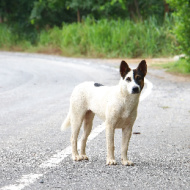RSPCA reveals shocking number of abandonment calls

The number of animals being abandoned is on the rise, increasing 24 per cent in 2022.
The RSPCA has revealed that in 2021, it received more than 100 reports of animals being abandoned every single day, with these figures rising in 2022.
Releasing the shocking figures as part of its Cancel Out Cruelty campaign, the charity has revealed that a total of 38,087 abandonment reports were made to its cruelty line last year, an average of 104 calls per day. This averages to four abandoned animals every hour.
Dermot Murphy, chief inspectorate officer at the RSPCA, said: “The idea of putting your cat in a cat carrier and taking them to a secluded spot in the woods before walking away, or chucking your dog out of the car and driving off leaving them desperately running behind the vehicle, is absolutely unthinkable and heartbreaking to most pet owners - but sadly we are seeing animals callously abandoned like this every single day.”
With the significant rise in pet ownership over the pandemic, the RSPCA is worried that the current cost of living crisis will mean even more animals are abandoned in the coming months.
In a report released by the RSPCA and Scottish SPCA, titled The Animal Kindness Index, the charities found that 78 per cent of owners believe that the cost of living crisis will impact their pets.
Of those surveyed, 68 per cent expressed concern about the increasing cost of care, and 19 per cent were worried about how they will afford to feed their pets.
Dermot Murphy urged pet owners: “We understand that sometimes the unexpected can happen - the pandemic and cost of living crisis proved that - but there is never an excuse to abandon an animal.
“There are always other options for anyone who has fallen on hard times and can no longer afford to keep their pet.”



 The Veterinary Medicines Directorate (VMD) is inviting applications from veterinary students to attend a one-week extramural studies (EMS) placement in July 2026.
The Veterinary Medicines Directorate (VMD) is inviting applications from veterinary students to attend a one-week extramural studies (EMS) placement in July 2026.